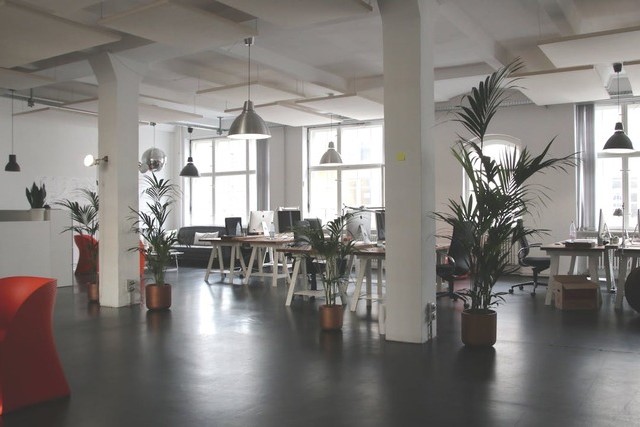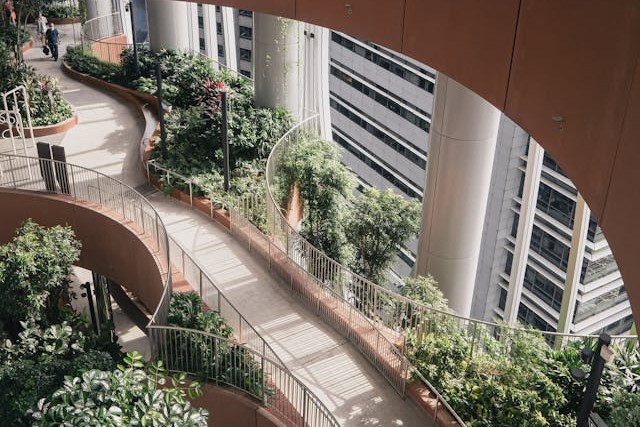
In recent years, there has been a significant shift towards prioritising well-being in the workplace. As time goes by, businesses have a better understanding of how the environment impacts employee health and productivity. In a 2021 survey, nearly 70% of executives rated well-being as a top priority for their organisation.
As a result, many companies are increasingly focusing on their office workers’ quality of life, creating office spaces that support both physical and mental well-being. One of the most popular and effective ways to increase productivity and improve different measures of workplace satisfaction is by incorporating plants in the office, as we will see in this article.
The Physical Benefits of Indoor Office Plants
Plants absorb carbon dioxide and release oxygen, creating an oxygen-rich environment and improved air quality. Previously conducted laboratory studies by NASA have shown that plants can filter out volatile organic compounds and other harmful toxins present in plastics, inks, cleaning products, and some types of insulation.
Indoor plants can also regulate humidity levels. According to the HSE, low humidity is one of the causes behind sick building syndrome. Offices often suffer from dry air due to temperature control, heating and air conditioning systems and layouts that interfere with airflow. Plants draw water from the roots to their leaves, releasing moisture into the air and helping maintain optimal humidity levels.
Moreover, plants can reduce noise levels in office spaces. When placed around a room’s perimeter or along partitions, plants can absorb, deflect, or refract background noise, making for a quieter and more peaceful working environment. Introducing more greenery like green walls or even just some desk plants is especially beneficial in open-plan offices that need noise-mitigating measures.

The Psychological Benefits of Office Plants
Several studies have shown that exposure to nature, even in the form of indoor plants, can have a positive impact on mental health. First of all, the presence of greenery in indoor spaces can reduce stress. UK researchers found that plants with rounded leaves and with a canopy shape were rated as being the most relaxing and conducive to well-being, as they were associated with positive memories.
Indoor plants also contribute to increased job satisfaction. Employees who work in environments that incorporate natural elements have been found to have up to 15% higher levels of creativity and are on average 6% more productive.
Also, the presence of plants can strengthen our connection with nature, which is particularly important in urban office settings where access to green spaces may be limited and where we’re constantly surrounded by electronic devices.
Last but not least, plants can improve cognitive functioning. Research shows that being around plants can improve concentration, memory, and creativity, since exposure to them can help with mental fatigue. This is particularly valuable in high-pressure work environments where focus and precision are a must.
How Plants Benefits Businesses
Earlier in this article, we’ve seen that exposure to indoor plants can lead to increased productivity. A more productive workforce means that businesses can expect better outcomes and higher efficiency when meeting objectives. This can translate into improved financial performance and a stronger competitive edge.
Another benefit involves a better company image and reputation. A well-designed work environment that prioritises employee well-being sends a positive message to clients and potential employees. It demonstrates a commitment to creating a supportive and sustainable working environment, which is especially important now given the growing awareness about biophilic and human-centred design. Not only that, an office with plenty of greenery and natural light makes a strong visual impact on visitors and reinforces the company’s brand and values.
Moreover, the presence of indoor plants can contribute to a more collaborative and creative work culture. When employees are more relaxed and open to dialogue, this can encourage teamwork and innovation, leading to more effective problem-solving and idea generation.
Finally, investing in indoor plants can be a cost-effective way to improve the office-based working environment. Not every business can invest in an office fit-out or in wellness initiatives for large teams, but plants are a relatively inexpensive upgrade to an indoor environment that requires minimal maintenance. In other words, introducing plants to the workspace offers a high return on investment to companies of all sizes, so they are a smart choice for businesses looking to create a healthier and more vibrant work environment without going over budget.

Conclusion
Bringing indoor plants into office spaces has multiple benefits: by improving air quality, regulating humidity, reducing stress levels and boosting cognitive function, plants can significantly create important improvements in the physical and psychological well-being of employees. For businesses, this translates into a more productive and engaged workforce, a better reputation, and stronger collaboration within and between teams.
Looking for a green workspace in London?
Has the above inspired you to include more plants in your office? Or maybe you’d prefer a move-in-ready office space in Central London that’s already brimming with greenery? We have various choices for serviced offices and workspaces across Central and Greater London that focus on bringing nature into the office. Call us on 020 3965 9617 to speak with a member of our friendly team. Our office space experts will help you and your business locate the perfect office in London to fit your business’s individual requirements.
For further reading, below are some of our other recent articles on workspaces, the workplace, and London’s office space market:
Cycling to Work in London: Bike-Friendly Office Locations
London Office Market Report 2024
Office Design Trends in Central London Office Space
New Developments in London Office Space: Central
Benefits of Modular Office Furniture for Flexible Workspaces
How to Upgrade Your Office Space in Central London
Navigating Central London Office Market Trends
Emerging Areas for Affordable Office Space: London
